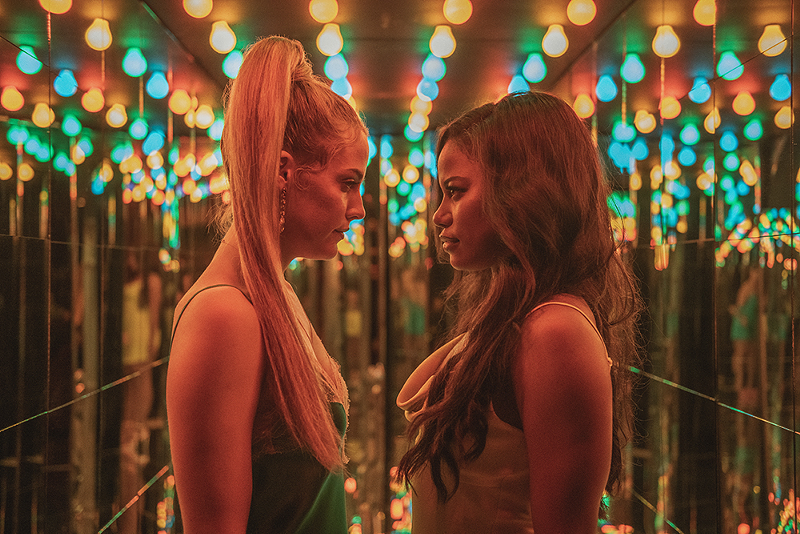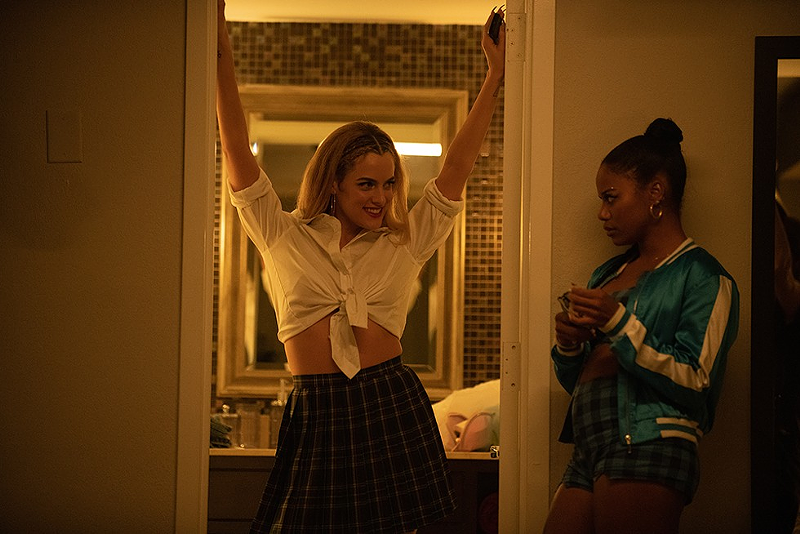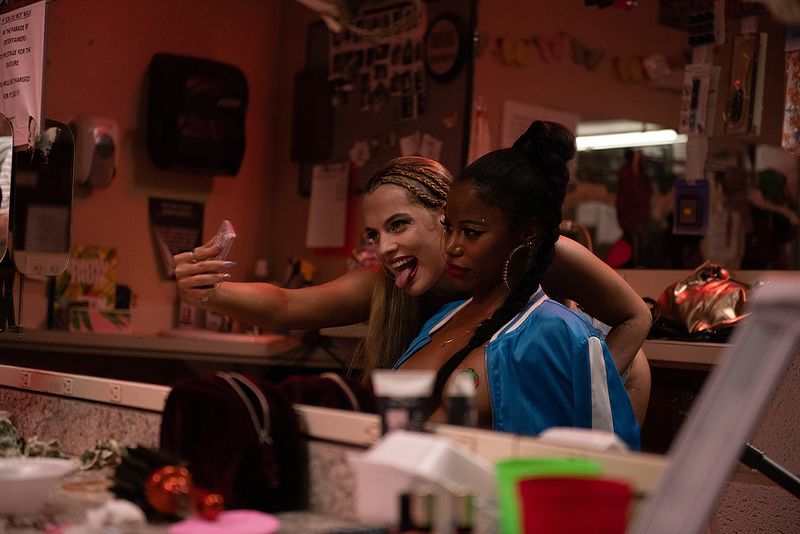At the corner of 14 Mile and Gratiot Avenue in Detroit, wedged between an optometry chain and Jawors Golf Center — a 60-year-old putt-putt spot where you can smack brightly colored balls between the legs of fiberglass dinosaurs, pink elephants, and one menacing off-brand Bugs Bunny — looms a building, nay, a citadel, where thirst, hunger, and deep-fried dreams had once been quenched.
The faded orange roof, blackened windows, and desolate parking lot give little indication of what once occupied the space before April when Macomb County's beloved "breastaurant" shuttered under the weight of pandemic and progress. There is no evidence of chicken wings, Buffalo shrimp, or frosty brews, nor of high-cut spandex shorts, low-cut T-shirts, and the women who expertly filled them.
The vacant Hooters in Roseville, which, before closing was one of only four remaining "delightfully tacky, yet unrefined" restaurants in Michigan, is also vacant of any proof that history had been made there in March of 2015. Needless to say, there is no plaque, shrine, or ill-placed commemorative bench to celebrate the creation of what is easily one of America's most culturally profound written works — well, technically it was typed — of the modern era: The Thotyssey or, as most came to know it when it was originally published on Twitter in 2015, #TheStory.
Not unlike Homer, Dante, and the great epic poets before her, A'Ziah "Zola" King penned a tale for the ages. Somewhere between fantasy, horror, comedy, a Lifetime movie, and a twisted-up morality tale, Zola detailed the saga of how a chance meeting at the Roseville Hooters led to a harrowing, life-changing road trip filled with murder (allegedly), mayhem (likely), and hoesim (confirmed).
"Y'all wanna hear a story about why me & this bitch here fell out????????" she famously teased in the dizzying and deliciously crafted first of 148-tweet thread. "It's kind of long but full of suspense."
For the uninitiated or, for those who were not active on Twitter six years ago, #TheStory goes a bit like this: A fresh-faced 19-year-old Zola meets 21-year-old Jessica Rae Swiatkowski while waitressing at Hooters. She and Jessica connect over stripping, something they both had been doing for a hot minute (while living in the Detroit area, she danced at Trumpps, Penthouse, and the Parthenon), and the two exchange numbers under the guise that they might work together in the future.
The future came just a handful of days later when Jessica invites Zola on a road-strip to Florida, where Jessica said they will be able to make some reasonable cash in just two days just by dancing. Per #TheStory, Zola was skeptical about taking "hoe" trips so soon after having met "this white bitch," but knows firsthand that dancing in Florida is lucrative and says she made $15,000 in the Sunshine state a few months prior. Zola hesitates but ultimately agrees, packing her "baddest stripper wear" while soothing her boyfriend, who was uneasy about her spontaneous spring-break trip.
"He DID NOT want me to go," she tweeted. "He was soooooo hurt so I had to fuck him calm, & then I left."
The trip had two additional passengers: Jessica's boyfriend, Jarrett, and an unnamed Nigerian man who Zola would eventually come to call "Z" hilariously late into the trip/story. The trip seemed par for the course when it comes to Florida-bound spring breaking: McDonald's and taking turns with the spinning of the radio dial. It isn't until the foursome reach their first Tampa destination that Zola begins to wonder what the fuck she agreed to.
They arrive at a dingy motel, and after a slow, but mildly successful shift of stripping at Tampa Gold Club, a topless-only joint that required Zola (who prides herself on being a "full nude typa bitch") to wear pasties and boyshorts, Z (who is still unnamed in #TheStory at this point) enthusiastically proposes the girls trap — in other words, prostitute themselves — to make some extra money. If you haven't picked up on the oh-so-subtle context clues, Z is a pimp and this, folks, is where things get, well, v pimpy.
The trip quickly devolves as Jessica begins turning discounted tricks out of a much nicer hotel Z had arranged for them as Zola, who refused to trap, and instead served as a "madam" of sorts, was tasked with collecting cash and patting down clients at the door for weapons and wires.
"Jess u sellin puss for $100?" Zola wrote after Jessica completed her first transaction. "Pussy is worth thousands."
Zola scraps Z's discount pricing for "puss" and sets Jessica up with a Backpage account, complete with better pictures and a better price tag of $500 per person. As a result, Jessica made $5,500 that night, and Z took all but $500, which he gave to Zola for her business-savvy tactics.
Let's speed this up, shall we? Jarrett befriends some dudes at the dingy motel, pissing off a very paranoid Z who forces the whole team to relocate so as not to have their cover blown. Jarrett and Jessica fight, Jarrett cries (as he will continue to do throughout this journey), and posts to Jessica's Facebook that she sucks dick, which sends Jessica spiraling and sends Z into a violent rage who then threatens to shoot Jarrett's dick off before having sex with Jessica in front of Jarret and Z's fiance because, oh yeah, she's there, too.
OK, OK, faster. Got it. So Zola sets up more outcalls for Jessica (sex gigs where the sex worker goes to a client's location rather than have them come to a hotel or trap house, etc.) and was even given a handgun. Neat! The final trick of the night involves Jessica arriving at a hotel room where several clients had requested her, uh, presence and bam! Jess is grabbed and dragged into the room once the door opens. Zola runs, finds Jarrett, Jarrett calls Z who, well, let's just say is in a less than savory mood and successfully retrieves a beaten and limp Jessica from her captors who just so happen to be, let's just say a rival pimp and a familiar face. Oh, did we forget to mention the murder? No? Hm. Well, that allegedly happened, too.
When they regroup, Jarrett threatens suicide and jumps from Z's fiancée's balcony because Jessica refuses to return to Detroit with him. The attempt is a failure on two accounts, as Jessica refuses to go home and because Jarrett survived his lovelorn leap. For Zola, the trip had been over almost immediately. Z provides Jarrett and Zola with plane tickets home, and that, folks, is #TheStory.
Oh, except for the last handful of tweets in which Zola says, shortly after returning home, she received a collect call from Jessica, who had been arrested for trapping in Reno and tells Zola that Z was caught trafficking underage girls and was wanted for six murders, including the one in Florida.
"Florida? Murder? U got the wrong number," Zola wrote.
And she hung up.
**********
Zola says working at Hooters was her first job ever, though not the one in Roseville where she met Jessica, but the now-closed Novi location.
"They're all closing," she tells Metro Times. "It's sad."
Born and raised in Michigan and moving throughout metro Detroit most of her young life, Zola celebrated her 18th birthday at Hooters and says she's not sure why, but she always wanted to work there. She would take part in Hooters' beauty pageants and bikini contests and likened the bond with the other girls to Greek life.
"I loved working at Hooters," she says. "It's something like a sorority, like we're all sisters forever. It really gave me that. And that's how I even started dancing. No, it's not sex work, but a lot of the girls who I worked with there were also dancers. So it kind of was my introduction to sex work. When you're a bartender or server or whatever, you get your regulars and it's kind of the same thing when you work at the club: you get your regulars. It's not sex work, but it kind of functioned in that way. And it kind of just... snowballed."
And snowball, it did.
Zola published an early version of her autobiographical road-strip tale on her popular Tumblr page in early 2015, but decided to see how it would play out on Twitter. After realizing that it hadn't taken off on Twitter, Zola deleted it and spent time actively re-working and re-writing it so that by October, she had the punchy, engaging, hilarious, and deeply terrifying string of tweets that, as Zola claims, served as the first-ever unofficial Twitter thread and is the reason the platform created the ability to link tweets. Her final version stuck the fucking landing and would quickly trend on Twitter as #TheStory, surpassing popular hot topics like #ISIS. Yes, as in that ISIS.
The online hype following #TheStory would move mountains for Zola (more on that later), but it was a moment for internet sleuths as they scoured the web for the truth as to what really happened in Detroit, Tampa, and all the unbelievable hoeism in between.
People created and contributed to countless Reddit threads trying to connect the most minor details in an effort to identify the man Zola referred to as "Z," which they did, thanks to mugshots, court records, and Facebook comments from women claiming to have been sex-trafficked by Z, whose real name is Akporode Uwedjojevwe but apparently also goes by "Rudy."
After coercing two young girls to prostitute themselves in Reno, Z was arrested and charged with sexual assault, battery, trafficking, and attempted pandering with threat of physical force. He pleaded guilty to some, but not all, of the charges and is now eligible for parole, despite being sentenced to 16 years in prison.
There's also a Twitter in Z's name, which was created in October 2015 with the sole intention of dismantling Zola's story. The account, which has been inactive for six years and uses an odd screenshot of Z's mugshot as a profile photo, links to a WordPress page dedicated to screenshots of Zola's past deleted tweets and draws comparisons between patterned hotel carpeting in photos shared on alleged Backpage listings made by a woman named Zola and the carpeting and wardrobe featured in the photos Jessica and Zola took on their trip. The page also questions Zola's innocence, calling attention to her knowledge of trapping, pimping, and the ease with which she navigated Backpage.
Jessica herself took to Reddit to share her side of things in a lengthy post titled "The Zola Story: Jess's Side," which claims the beginning of #TheStory is the only part of Zola's account that is true, and agreed that they did meet at Hooters, stayed in a dingy hotel, danced at a shitty club, and that Jarrett posted to Jessica's Facebook and threatened to jump off the balcony. But that's where the similarities basically end. She says she was the one to rescue Zola from the rival pimp.
"I give Aziah a round of applause on her creativity," Jessica wrote. "After years of a blog and trapping this girl finally got some attention."
Internet sleuths also discovered a fourth storyline within a now-inactive and since-hacked/spam-ridden Twitter account believed to have belonged to Jarrett Scott, where he debunks some of Zola's version, but mostly details, in a spell check's wet dream, his experience and, in his own way, the hurt of watching Jessica get sucked into Z's orbit, or, as he wrote, watching his girl get "pimped out."
Jarrett's story is far more anti-climatic than Zola's and claims there was no confrontation with the challenging pimp, let alone gunfire and murder, and says that Zola wasn't actually around for that transaction at all. He did, however, admit to threatening suicide. He also said he knew Zola was getting played by Jessica, which tracks with Zola's side of things.
"Well i dont have no follower and idc who reads this but here i am and im gunna clear shit up and im gunna clear it up real quick," Jarrett's thread begins, unintentionally attempting to match the magic of Zola's suspenseful intro, but rather sadly fails to do so.
***********
“WELL THAT'S A GLIMPSE INTO A LIFE I'LL NEVER HAVE," one #TheStory reader commented in 2015.
"jesus she is like the stephen king of ho tales," another says.
Others were happy to suspend disbelief.
"whole thing. I don't even care if its not real, thats an awesome story haha," one Twitter user wrote.
For some, a story about sex trafficking was too dark to be entertaining.
"Read the whole thing," one commenter said. "Other people may think different, but this is seriously depressing shit. Mildly interesting, but... jesus. Upsetting."
However, amid the flurry of comments were a mix of praise and white people complaining about her use of slang, a recurring declaration was made by many a commenter across the multiple platforms on which #TheStory has been published, including Imgur.com, where the original Twitter screenshots have been living rent-free since 2015: "Why isn't this a movie?"
The Roseville Hooters would serve as the backdrop to yet another life-changing event: a massive Rolling Stone profile by David Kushner. "Zola Tells All: The Real Story Behind the Greatest Stripper Saga Ever Tweeted" was published less than a month after #TheStory took a social-media-obsessed world by storm. Kushner described Zola's tweets as being like "Spring Breakers meets Pulp Fiction, as told by Nicki Minaj" and dove deep into Zola's life before, after, and during #TheStory over a platter of Hooters' chicken wings.
The Rolling Stone piece caught the attention of actor and filmmaker James Franco, who flew Zola out to California for a meeting in 2016.
Shortly after their meeting, during which Franco asked Zola to detail the entire road trip, putting down the encyclopedia he was casually reading to engage with her retelling, it was announced that Franco would star in and direct an adaptation of Kushner's Rolling Stone article, something that irked Zola because there would be no article without the tweets that inspired them. Zola, though skeptical of a white man showing interest in her story, another example of the colonization of Black Twitter, trusted Franco.
"We had a great experience," Zola says of Franco. "He actually just ended up having to step down for ... his own personal reasons."
The truth is Franco has worked sparingly since mid-2018. Allegations were first leveled against Franco in 2014, when the actor admitted to grooming a 17-year-old girl via Instagram DMs and, in 2018, at the start of Hollywood's #MeToo reckoning, Franco accepted a Golden Globe award for Best Actor in a Comedy or Musical for The Disaster Artist, which sparked several women to come forward with accusations. Among them, actress Ally Sheedy, who did not disclose details in her accusatory tweet, and actress Violet Paley. Paley, who had been in a consensual relationship with the actor, accused Franco of sexual misconduct against her and her 17-year-old friend.
Franco has denied the accusations yet says he publicly supports "people coming out and being able to have a voice." A Los Angeles Times exposé featured accounts from five women, all of whom were students at Franco's acting school, and all claimed he exploited them sexually and exercised an abuse of power as their mentor. Earlier this year, he reached a settlement deal with his former students; meanwhile, frequent collaborator Seth Rogen announced that he has no plans of working professionally with Franco in the future. Franco's IMDB.com page has but one recent acting credit for a film that is in post-production.
"I think that this ended up working out in my favor," Zola says of Franco's departure. "At the time maybe I didn't really realize it. Now, looking back and really analyzing everything, I think that it's important that Black creatives really work together because we kind of all come from the same world, right. Whether we want to or not, we all experience a similar reality, especially when it comes to our stories and our voice and being protected and being listened to," she says. "I think it's easier when Black creatives work with Black creatives — we kind of lean on each other in that way."
As it turns out, director Janicza Bravo, a Black woman, had been eyeing #TheStory since it went viral on Twitter because she, like so many others, found herself totally transfixed by the beautiful mess of it all. She lost out on a bid to option the script early on, but for Bravo her interest was more in the woman, the writer, and the artist behind the tweets — and the fearlessness with which she wrote them.
"Her voice really spoke to me and, honestly, there's something kind of, I guess maybe like celestial, that just kind of pulled my gut to it," Bravo says. "I felt I was going to protect her narrative, and I was down to do that through and through, no matter how long it was going to take for us to get there."
Bravo says that making movies is hard and that a lot of the process can be rather unsavory.
"I just was onboard for whatever that road was going to be," she says, "but I mostly felt that I was right for it because the story that the real Zola wrote is a story written by someone who was processing their trauma and using humor and wit to get us through that crunchy narrative or that crunchy experience she had gone through. And I felt that's what I was doing in my work and that's what I was doing in my life, and so I felt close to it and thought I'm the best person for this because it is literally all of my work. My body of work is this."
Bravo, once again, threw her hat in the ring when she caught wind that Franco was planning to drop out and, to her surprise, she was hired. She says she was introduced to Zola soon after getting hired and what surprised Bravo most about the woman who wrote a larger-than-life tale, likely on a cell phone with acrylic nails, was how small she was.
"I don't mean her size," Bravo explains. "I mean how small her voice is. Even the octave in which she speaks is also very little. And I realized that she had this dual personality — she had a front of the house and back of the house personality, which is something that we wanted that I immediately clocked, and was like, oh, we have to bring that to the screen. We had to put that onscreen. And I think that that has to do with how we interpreted having Taylour [Paige] play something that felt a bit smaller or more grounded because the writer in her wrote a very big personality, she wrote a 'Sasha Fierce,' so to speak. But when you're actually intimate and you get invited inside of her, what she is, is actually a little girl."
Because there was already a script, Bravo enlisted Black playwright Jeremy O. Harris (Slave Play) to rewrite what Franco's team had crafted. Harris considers himself the authority on Franco's script and jokingly estimates he had read it somewhere around 45,000-or-so times.
"I think a big thing we learned was that the script's interests were in an audience that we were less interested in taking care of, namely a male or white male audience," he says. "[Zola] directed the story towards an audience of other Black women, other sex workers, other people who, like, already understood the language. And she was like, if you get it, you get it. If you don't, you don't. And I think we decided to take upon that ethos when we were working on it."
"I think sex work should be talked about and represented by sex workers, whether, you know, currently or retired or whatever the case is," Zola says. "I think it's a reality that you can really only paint a clear picture of if you have some type of experience, I think."
Paige, who stars as Zola, had initially turned the role down due to Franco's take on Zola's tale, even though Paige was actively pursuing onscreen work as a young, upcoming actress.
"It was originally just two white men trying to have a Black voice," she told Interview. "The writing felt very sexist and racist. It didn't jive with the tweets that I read. The voice didn't match what I saw her write."
For Harris, nothing's more cringe-worthy than hearing Zola's writing referred to as amateur — he, without pause, compares her to Arthur Rimbaud. He says it's clear by reading Zola's Tumblr that she's always known what kind of writer and storyteller she is and that #TheStory was the result of having gained and maintained a social media following through her writing.
"She felt like a great poet, and what we were doing was, like, adapting an epic poem to the screen," Harris says. "Which means that there are gaps that have to be filled, but like, there [were] so many images in our head already, it wasn't difficult."
Bravo and Harris delivered what Franco and co. could not: a story that not only accurately reflected a Black sex worker's truth while shifting the male gaze, but also expanded upon the world that Zola created and occupied — one that is colorful, surreal, and, against all odds, really fucking fun, complete with a Pavlovian take on cell phone pings and notifications — though there is a possibility that the film will alter how you view the penis, like, forever.
You're welcome?
"Janicza and Jeremy really made sure that their first priority was keeping my voice heard, if that makes sense," Zola says. "It's like, even with their input, they made sure to keep its core values and the things that make me me, you know? I think they really dedicated themselves to that, and I appreciated them for that the entire time. I mean, from Day One, I knew really what this could be. And I always had agency over my voice, but I think when it comes to this industry and this being the first time that something like this has happened, I mean, it was kind of uncharted territory."
In the same way that Zola feels as though the filmmakers were her advocates in terms of the storytelling, she also says they fought for her behind the scenes, as well, with Bravo demanding an executive producer credit for Zola.
"It wasn't that it wasn't offered to me or that it wasn't an option," Zola says, "but I didn't even have the knowledge to ask that — you know what I'm saying? Like, what am I even asking for? So I think they really protected and fought for me in that sense."
The adrenaline-fueled, kaleidoscopic fever daydream also stars Riley Keough as Jessica (renamed Stefani for the film), Succession's Nicholas Braun as Jarrett (renamed Derrek), and Colman Domingo as Z (renamed X). The film is just 90 minutes, which Bravo says is her sweet spot when making or watching a film, yet straddles the unique balance of getting the "full story" and wanting more, which was the filmmakers' intention from the start.
"The story is 'Do you want to hear a story about how me and this bitch here fell out?' and that's the story that we told," Bravo says. "I was telling a story — a love story, right? Or a story of friendship. And it starts at that tweet. And for me, it ends in that car. That is the story of how the friendship fell out. It's clearly over, and the prologue or the epilogue are not the story I was telling, but I also wanted the audience to walk away and go, 'Well, where is the rest of this?'"
Of course, within the framework of the 148 tweets, the film took some liberties, notably with how Jarrett's suicide attempt plays out, but what the filmmakers also masterfully did was assign subtle character traits, quirks, and nuances to people we felt we already knew pretty well, thanks to Zola's intimate style of writing.
For example, during the road trip portion of the journey, Zola, Stefani, Derrek, and X stop to pee at a gas station. Zola can be seen cautiously hovering over the toilet bowl, her pee, a healthy shade of diluted yellow; whereas Stefani plants her whole bare ass on the seat with no hesitation and shows zero concern for her dehydrated neon yellow urine. Since we're talking about piss, X appears to grunt and wince every time he pisses, which is shown enough times in the movie for us to deduce that he, a two-timing pimp, may have a sexually transmitted infection or painful blockage caused by, well, who fucking knows.
"It gets better every time, honestly," Zola says of the movie. "It's like I noticed something else each time. And really watching it with an audience — it's like every audience is so different, and that's a part of the experience for me. It gets better every time. It gets funnier every time."
**********
Zola says she never feared for her life, at least not during the trip to Tampa.
Despite the sex trafficking, guns, suicidal boyfriends, and, the fact that she was a Black sex worker in the South, Zola says getting through the whirlwind trip required confidence and a zen-like approach in dealing with, well, idiots.
"I knew that I was kind of the smartest person in the room, so I was already home in my head," she says. "It was a mind over matter situation. And I just knew that as long as I played my role, I was going to get home fine. There wasn't a time where I personally felt threatened. There were points where I was fearful, but I was moreso fearful just of the circumstance. I mean, it was a really weird spot to be in, but I knew, just based off my experience — and I've been in so many shitty situations like that — I just knew how to maneuver my way through that."
"I mean, even when it came to not taking clients, [Z] kept going to the Walmart, and this isn't in the movie or the Twitter thread because I didn't have time to tweet all that. But he kept going to the Walmart to get a new burner phone 'cause I kept saying, like, my phone's not working, but I really just never set it up," Zola says. "It's like, but how stupid are you to, like, not look at the phone? Like, come on. All I have to say is no one's calling the phone and you'll leave me alone. I'm definitely getting home this weekend."
The truth is, Zola is likely the smartest person in most rooms.
An amalgamation of Zola's social media bios describe the 26-year-old as a "mom first, ho immediately after," pansexual, writer, artist, songwriter (she released an EP last year), and the inventor of the Twitter thread. Per Twitter, if Zola's blocked you, you can CashApp her $25 to get unblocked, which is just one of several examples of why she could add "businesswoman" to the eclectic list.
Not mentioned? Published author, which the Atlanta-based mother of two officially is as of this month, thanks to a collaboration with A24, which released a limited-edition bound hardcover collection of Zola's 148 tweets with a foreword by New York Times bestselling author Roxane Gay, dedication by the author, and an afterword by Bravo.
"Signed a few copies," reads a caption on an Instagram photo of Zola smiling behind a mound of her books.
"It's giving Pulitzer Prize. It's giving collectors item."
This photo is just one of many recently posted in which Zola appears to be embracing a life of joy, one that is not guaranteed but one that is built, earned, and owed; one that is challenging, but no longer difficult. From red carpets and discussion panels to book signings, film screenings, club openings, mid-afternoon naps with her youngest, ZäZen, attached to her breast while her oldest, Anaïs, twirls in sundresses, the life Zola chooses to openly share with the world is not dissimilar to the road-strip nightmare detailed within her tweets-turned-movie-turned book, which, she says, somehow isn't even the craziest thing she's experienced — and we have no choice but to believe her.
What Zola presents, in addition to resilience and an incredibly refined level of hoeism (your fave could never) is that you can reach for whatever fucking star you want, as long as your heels are high enough.
"I really just want — not even just my girls, but women everywhere, period — I want them to take away that I did this just by being myself, which I've always been," Zola says. "So I just hope they learn that authenticity is key and walk in your truth, 'cause that's really all I did throughout this entire experience and in that experience and tweeting it in 2015, and throughout the creative process. I mean, in every circumstance, what kept me protected and what kept me lifted was just being myself," she says. "And that's not even how I was then. That's just how I am."
Zola opened in theaters on June 30.
This story was originally published by CityBeat sister paper Detroit Metro Times






